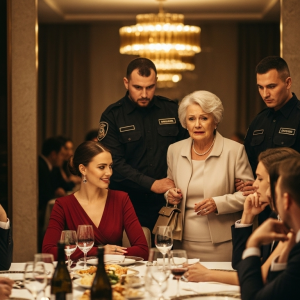Clayton Holloway stood in his garage, methodically cleaning his hunting rifle, when he heard the front door slam. The sound echoed through their suburban home like a gunshot. At 42, after fifteen years in Army Special Forces and three tours in Afghanistan, he had learned to read danger in the smallest details.
“Dad?” His 10-year-old son Mark’s voice cracked through the silence, high and nervous.
Clayton set down the weapon. Inside, he found Mark hunched over the kitchen island, his small frame shaking. “What’s wrong, son?”
Mark’s head snapped up, revealing tear-streaked cheeks. “Dad, promise me you won’t get mad.”
Clayton nodded, though every instinct screamed danger. In Kandahar, that feeling meant IEDs. In his pristine kitchen, it felt infinitely worse.
“My friend’s dad works for the police,” the words tumbled out between sobs. “He said something about Mommy. He told me to give you this.”
With trembling fingers, Mark handed over a crumpled piece of paper. Clayton’s world tilted as he unfolded it. The words were written in the familiar handwriting of Detective Clint Hampton, a 20-year veteran of the force whose son played Little League with Mark.
Clayton, meet me at Murphy’s Bar tonight at 9 p.m. Come alone. What I have to show you about Rebecca will destroy your family, but you need to know. Trust no one else with this. -Clint
Clayton’s expression never changed, but inside, the cold calculation that had kept him alive in war zones activated instantly. He’d met Rebecca seven years ago, drawn to her sophisticated beauty. She’d claimed to love his strength, his unwavering principles. Now, staring at Clint’s warning, Clayton realized he’d been living with an enemy.
Hours crawled by. Rebecca returned from her “book club” at 6:30, her designer dress unrinkled, chatting about her day with a voice as bright and artificial as porcelain. At 8:45, Clayton kissed her forehead, a gesture that now felt like marking a target. “Going out for a beer with the guys,” he said. “Back late.”
Murphy’s Bar squatted on the outskirts of town, all dark wood and dim lighting. Clint Hampton arrived precisely at nine, his face grim. He slid a manila envelope across the scarred table without a word.
“How long?” Clayton asked, not touching it.
“Six months that I know of. Probably longer,” Clint’s voice was heavy. “I’m sorry, Clay.”
Clayton opened the envelope. The photographs showed Rebecca entering a downtown hotel with Aaron Weaver, a local real estate developer. In the final photo, they were kissing with the desperate passion of teenagers.
“There’s more,” Clint said quietly. “Audio recordings. Video from the hotel room. She’s been using your credit cards to pay for their meetings.”
Something cold and ancient awakened in Clayton’s chest. Not rage—rage was hot and wasteful. This was the patient, methodical fury of a predator. He had been forged in the crucible of war, with a moral code carved in stone: loyalty above all else, and zero tolerance for betrayal. Rebecca had violated the fundamental rule of his existence.
Clayton returned home to find Rebecca asleep. He moved through the house like a ghost, his Special Forces training making him soundless. In his study, he began what he did best: intelligence gathering.
Aaron Weaver’s life unfolded across his screen. A mid-level real estate developer living beyond his means, leveraging one investment to fund the next in an increasingly desperate pyramid. His social media painted him as a man who believed his own press releases. More interesting were the personal details: Aaron had grown up in foster care, with no family or real friends who would miss him if he simply disappeared.
Clayton’s phone buzzed. A text from Rebecca’s phone, sent from their bed just three feet away. “Couldn’t sleep. Thinking about you all night. Can’t wait until Friday.”
Friday. Two days away.
The next morning, after Rebecca left for her fictional yoga class, Clayton called in sick to his security firm—his first sick day in three years. He had work to do. He spent the day conducting surveillance, confirming Rebecca’s deceptions. That evening, he installed military-grade spyware on her laptop and phone.
The first intercept arrived twenty minutes later. Rebecca, supposedly reading in the bedroom, was texting Aaron. “He suspects nothing. Friday can’t come soon enough. I’m so tired of pretending.”
Aaron’s response chilled Clayton’s blood. “Soon you won’t have to. Once we’re together, you can divorce him and take half of everything. Guy’s a decorated war hero. Judge will favor the poor, abandoned wife.”
Rebecca replied. “What about Mark?”
Aaron’s answer was brutal. “Kid’s not mine. Not my problem.”
They weren’t just planning to destroy his marriage. They intended to steal his son, his home, his future. They intended to use his military service—his honor—against him, painting him as an unstable veteran suffering from PTSD. It was almost brilliant. It was also their death sentence.
Aaron Weaver had made one crucial mistake: he’d underestimated his target. Clayton Holloway had toppled enemy governments with less information. By midnight, he had assembled a complete psychological profile of his targets and identified seventeen different pressure points he could exploit. The hunt was about to begin.
Friday evening arrived with the weight of destiny. At 6 p.m., Rebecca appeared in his study, wearing a red dress he’d bought her for their anniversary—a particularly vindictive detail. “I’ll be late tonight, honey,” she smiled. “Dinner and drinks with Ann.”
After she left, Clayton activated his surveillance network. He watched her drive directly to the downtown hotel where Aaron waited. His phone buzzed. His old Army contact, Lawrence, now a private security consultant, was in position with his team.
It was time to shatter their world.
His first call was to Rebecca’s friend, Ann Holland. “This is Clayton Holloway,” he said, his voice carrying the authority of command. “I need to speak with you about Rebecca and Aaron Weaver. The Hampton Hotel, room 412. You have fifteen minutes, or I start making calls to your employer and your ex-husband.”
Next, he called Aaron’s office, leaving a message with a voice modulator that perfectly mimicked Detective Hampton’s gravelly tone. “Aaron, this is Detective Hampton. We need to discuss your relationship with Rebecca Holloway immediately. Call me back within the hour, or we’ll be having this conversation downtown.”
Finally, he called the emergency number for Samantha Wells, the high-conflict divorce attorney they had on retainer. “Ms. Wells, Clayton Holloway. I understand you’ve been preparing paperwork concerning my marriage. We’ll be discussing your unethical pre-filing communications with my wife in court. Client privilege doesn’t apply to criminal conspiracy to commit fraud. Good night.”
Three carefully placed calls had just turned allies into panicked enemies. His surveillance feeds showed the cracks appearing. At 8 p.m., Clayton activated phase two.
He sent a text to Rebecca’s phone, spoofing Aaron’s number: “Emergency. My ex-wife found out about us. Threatening to call your husband. Need to talk NOW.” Simultaneously, he sent a text to Aaron’s phone, spoofing Rebecca’s: “Clayton knows. Ann told him everything. Going to his office to smooth things over. Don’t contact me.”
Both targets were now isolated, operating on false information. He then called the hotel’s front desk from a burner phone, reporting suspicious activity in room 412. Aaron, alone, would now face questions from hotel security, believing Rebecca had abandoned him.
The final touch was a group text sent from an untraceable number to Rebecca, Aaron, Ann, and the lawyer. “The meeting is tonight. All parties present. Hampton Hotel Parking Garage, Level B2. Come alone or face the consequences.”
The message would terrify them, each assuming one of the others had betrayed the group. By 8:30, his surveillance showed all four targets converging on the hotel in various states of panic. Clayton locked his house and drove toward downtown. The most effective battles are won before the enemy realizes they’re under attack.
The parking garage had become a pressure cooker of fear and accusations. Clayton watched through his surveillance system as Rebecca and Aaron argued, their trust shattered. As their co-conspirators arrived, he triggered the hotel’s fire alarm. The piercing wail and flashing emergency lights added to the chaos.
He then used his voice modulation system to call each of their phones simultaneously, feeding their paranoia. To Rebecca: “Aaron sold you out.” To Aaron: “Rebecca is wearing a wire.” To the others: “Your clients are discussing a plea bargain. You’re the sacrifice.”
The alliance exploded. The lawyer and the friend fled, abandoning Rebecca and Aaron. Clayton started his truck and drove toward the garage entrance. As his headlights swept across the scene, he saw Aaron backing away from an advancing, screaming Rebecca. He parked and stepped out of his truck with the deliberate calm of a hunter. They both froze.
“Hello, Rebecca,” Clayton said.
“Look, man, this isn’t what it looks like,” Aaron stammered.
“I know exactly what this is,” Clayton interrupted. He pulled out his phone and played a recording of Rebecca’s voice: “…divorce him and take half of everything.” The blood drained from her face.
Aaron, cornered, reached into his jacket. Clayton saw the glint of a weapon, but Aaron Weaver had never faced a Special Forces operator. Clayton moved with fluid precision. One strike disabled Aaron’s gun hand. A second put him on the concrete, gasping and helpless.
“Clayton, please,” Rebecca was backing toward her car. “We can work this out.”
“No,” he said, his voice final. “We can’t.” He pulled out his phone and dialed 911. As sirens wailed in the distance, he stood in the harsh fluorescent light, surrounded by the wreckage of his marriage.
In the police interrogation room, Rebecca tried to spin a tale of a stalking, threatening husband. But Clayton had the evidence. When Clint Hampton presented her with the recordings, the texts, and the surveillance photos, her story collapsed.
“You have one chance,” Clayton said after the detective left them alone for five minutes. “Surrender might leave you with something to salvage. Defeat means I take everything and salt the earth behind me.”
He laid out the terms. She would confess to adultery and conspiracy to commit fraud. She would waive all claims to marital assets and forfeit any custody rights to Mark. In return, he would not pursue the full extent of the charges against her and her co-conspirators. She chose survival. Over the next hour, Rebecca Holloway systematically dismantled her own life, signing a full confession.
Three months later, Clayton stood in his backyard, watching Mark practice baseball. The boy’s confidence was returning, day by day.
The legal proceedings had been ruthlessly efficient. Rebecca was sentenced to 18 months in a minimum-security facility for fraud. Aaron Weaver, facing a massive federal investigation into a real estate scheme that Clayton’s intelligence had helped uncover, was now looking at 15 years in federal prison. Their co-conspirators had vanished, their careers and reputations in tatters.
“Dad, watch this!” Mark called out, hitting a line drive across the yard. Clayton smiled, a genuine expression that felt foreign after months of calculated coldness.
His secure phone rang one last time. It was Clint. “Clay, just wanted you to know Rebecca’s parole application was denied. She’ll serve her full sentence.” He paused. “There’s something else. Aaron Weaver was found dead in his cell this morning. Apparent suicide, though the circumstances are unusual.”
Clayton felt no surprise, no satisfaction, no regret. “I see.”
“Clay, you wouldn’t know anything about—”
“Clint,” Clayton interrupted gently. “I’m a single father raising a 10-year-old boy. My days are filled with homework, baseball practice, and bedtime stories. I don’t have time for anything else.”
After ending the call, Clayton destroyed the secure phone. That part of his life was over.
He checked on Mark one final time before bed. The boy was sleeping peacefully. This was his real victory. Not the destruction of his enemies, but the preservation of his son’s future. He had fought his war and won completely. Mark was safe, loved, and would grow up understanding the difference between strength and weakness, loyalty and betrayal. The war was over. The future belonged to the victors.
Two years later, the silence in the Holloway home was no longer heavy with unspoken lies, but light with normalcy. It was filled with chatter about homework, the rhythmic thump of a basketball in the driveway, and the easy laughter of a twelve-year-old boy rediscovering his carefree spirit.
Clayton had left the security firm. The world of shadows and surveillance was too close to the man he had been forced to become in his war with Rebecca. Instead, he’d opened a small woodworking shop, creating things of strength and reliability with his own two hands. The work required patience and precision—skills he’d honed in the military—but the result was beauty and utility, not destruction.
Mark, now twelve, moved with a new confidence. The haunted look that had shadowed his eyes was gone, replaced by the clear, steady gaze of a boy who knew he was safe. He had become a talented pitcher on his Little League team, with a strong arm and a calmness under pressure that Clayton recognized with a mix of pride and a faint ache.
They were on a camping trip in the Blue Ridge Mountains, an annual tradition they’d started after Rebecca was gone. That night, as they sat by the campfire, the flames dancing against the tall pines around them, Mark broke the comfortable silence.
“Dad,” he asked, poking the fire with a stick, “do you ever miss Mom?”
The question was direct and free of accusation. Clayton had been waiting for it. He looked at his son, seeing the young man he was becoming. “I miss the woman I thought she was,” he answered honestly. “The woman I married. But I’ve come to realize that person may never have really existed. I don’t miss the person who made the choices that hurt our family.”
Mark nodded, mulling this over. “Uncle Clint said Mr. Weaver died in prison.”
“He did,” Clayton said, his voice even.
“Was it because of you?”
Clayton stared into the fire, the memories of that night—the betrayal, the cold calculations—flickering like distant ghosts. “Mr. Weaver made a lot of bad choices, Mark. He hurt a lot of people. Sometimes, when a person lives like that, things fall apart. I didn’t push him, but I certainly didn’t catch him when he fell. There’s a difference.”
It was the most important lesson he wanted his son to understand: a lesson not about revenge, but about consequences.
“Your mother chose her path,” Clayton continued, his voice softer. “And I chose you. Every single day, I will always choose you.”
Mark looked up from the fire, and in his son’s eyes, Clayton saw understanding. “I know, Dad.”
As the first stars appeared in the vast, dark sky, Clayton put his arm around his son’s shoulders. The war was a ghost, a memory of a man he no longer had to be. This… this was peace. A peace he had not just won, but built, one day at a time. They had survived not by destroying their enemies, but by carefully rebuilding their own world on a foundation that could not be broken: loyalty, truth, and the love of a father for his son




